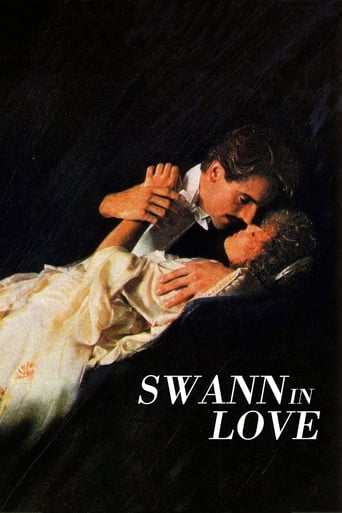Kirpianuscus
for me, this film has only two virtues . the first - Alain Delon who is the perfect baron de Charlus. the second - the conviction than only Luchino Visconti could be able to direct Proust masterpiece. it is unfair to say that it is a bad film. it is only a decent try . in which the lead actors are uncomfortable in the clothes of the roles. because, at the first sigh, all is correct. performances, atmosphere, the adaptation. but something is missing. the flavor of the universe of Marcel, the poetry of the lines of paper, the nuances, the delicacy, maybe the nostalgia . it is an exercise. admirable. but not exactly convincing.
jandesimpson
Let's face it, Proust's monumental "A la Recherche du Temps Perdu" is probably unfilmable. The Chilean director Raoul Ruiz had a commendable shot at adapting the final volume "Time Regained" in 1999 that achieved a certain measure of critical acclaim in spite of being rather diffuse with not all the characters clearly presented. ( I think you have to know the novel well to fully appreciate it). A rather more satisfying attempt appeared fifteen years before with Volker Schlondorff's "Swann in Love". By concentrating more modestly on what is really a vignette, a novella tucked within the vast structure, Schlondorf achieved a work with a real sense of cinematic concentration. There is no Marcel, whose endless reminiscences are something of a kiss of death to film narrative and no confusingly vast set of characters to get to grips with. There is simply Swann, the man about town, his obsessive pursuit of the whore, Odette, and the characters he bumps into during the course of a short space of time and a brief epilogue some years later. It is a very free adaptation. I cannot remember the Baron de Charlus appearing much at this early stage of the novel, but, as he is one of Proust's most fascinating creations, his presence is welcome, even if John Malkovich in the later version is better cast than Alain Delon. What strikes most forcibly is Schlondorff's unflinching look at a thoroughly decadent and degenerate society. In studying only the rich he paints a portrait of the lengths they are prepared to go to satisfy hedonistic pleasure and, in the case of Swann, lust. In an amazingly frank scene he sodomises a prostitute but is obviously more interested in obtaining information about Odette from her than in what he is doing. Sven Nykvist's camera glides through salons stuffed with rich objects and people: this is a world where the poor simply do not exist. All around however are flunkies whose sole purpose in life is to serve their masters uncomplainingly. Just occasionally a look, such as the coachman Remi's, when he is ordered by Swann to drive him half the night in his pursuit of Odette, says it all.
grandisdavid
I really admire the work of Volker Schlondorff, I think he is one of the best German director nowadays with Wenders (although in a very different style). His adaptation of Proust is quite good but several things really annoyed me. _first, the soundtrack: why using an atonal composition of Henze when Proust, who loved Wagner, filled his novel with specific musical references? It simply does not fit the atmosphere! Any chamber music of the late nineteenth or early twentieth centuries would have been better! _second, the acting: I am french and I really think Alain Delon is way overrated, he's simply mediocre. However, I really like Jeremy Irons, and Ornella Muti is usually quite good, but their dubbing is absolutely awful and ruins totally their acting! So I understand that Irons would have had a very strong English accent if he had been asked to act in french but if Schlondorff decided to shoot the movie in Paris with 90 percent of the cast being french, why in the hell didn't he choose two other french actors for the leading roles? I have nothing against English actors, on the contrary, but then, he should have shot the movie in English rather than dubbing miserably these good artists. _Third, the movie is sometimes a little slow. Usually, Schlondorff does a much better job with the editing. If you want to discover the terrific job of this great director, you should rather see "The Tin Drum", "The Ogre", "The Handmaid's Tale" or "Death of a Salesman" before this one.
PayOrPlay
According to IMDB this seems to have been the first time anyone ever tried to adapt Proust to the movies. And though flawed, it's not a bad try--kind of languid, but that was probably deliberate. Jeremy Irons is one of the best at portraying repressed longing, and Ornella Muti is exquisite enough to explain Swann's amour fou.



